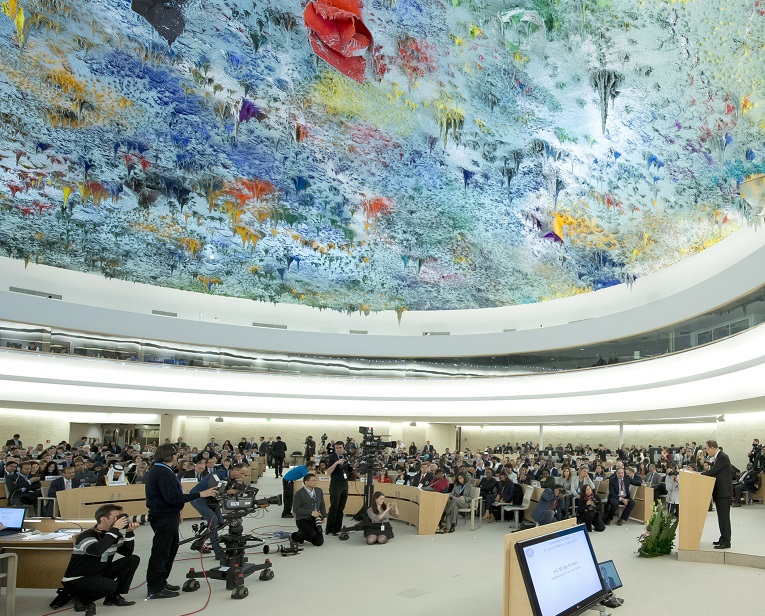On Thursday 3 March 2016 the Human Rights Council, at its 31st session, convened an historic Panel Discussion on Climate Change and the Right to Health. The panel, held in Geneva, provided both the opportunity for States, international organisations and Non-Government Organisations to discuss the impacts of climate change on the right to health, as well as a forum for the sharing of experiences and best practices. The Mary Robinson Foundation- Climate Justice participated as an observer.
Panellists highlighted the growing threat to the right to health that climate change represents. A central theme was that climate change represented a threat multiplier, impacting the right to health in multifaceted and often devastating ways.
Dainius Puras Special Rapporteur on the right of everyone to the enjoyment of the highest attainable standard of health affirmed Mary Robinson’s statement that ‘climate change is the greatest single emergency of our lifetime’ noting that the effects of climate change on the right to health are already alarming, causing an increase in morbidity and mortality. He spoke not only about the direct impact changing climate and environment can have on the right to health, for example through decreased access to nutrition and clean water but also the knock on affects that climate change can have to human security. He reinforced the legal and moral obligations of States to combat climate change and its associated impact on the full enjoyment of human rights.
Ms. Hindou Oumarou Ibrahim highlighted the unique affect climate change is having on the right to health for indigenous people around the globe as it alters environments and biospheres to limit the availability of traditional medicines and foods. She also noted the impacts climate change mitigation efforts can have on indigenous groups where the land and water rights of those groups are not strongly protected, this creates knock-on effects on the mental and physical health of those dispossessed. She called for greater synergy, at the national and international level, between human rights and climate change policy making. In doing so highlighted the lack of human rights or gender equality issues being addressed in countries’ Intended Nationally Determined Commitments under the UNFCCC.
Ms Cristina Tirado noted the impact that climate change would have on the health of future generations, in particularly the increased prevalence of disease and limitation on the access to adequate nutrition. She advocated greater involvement in education for affected communities, with a particular focus on women’s education.
Finally Lilibeth C. David, Undersecretary Department of Health, Republic of the Philippines, brought to light the consequences of climate change at the national level. She particularly focused on the health losses due to the increased number of devastating extreme weather events, and in the shifting patterns of climate sensitive diseases, such as dengue.
Countries participated actively in the discussions, asking panellists for further information on a wide range of issues including the engagement of the private sector, the impacts of climate change on the health of women, and funding for adaptation.
The panel session was followed by an interactive dialogue with John Knox Special Rapporteur on human rights and the environment presenting his report on human rights and climate change to countries. The dialogue was robust with countries noting the importance of responding to climate change in a fair and equitable manner will necessitate focusing on climate change. The Foundation found the statement by the Dominican Republic on behalf of the Community of Latin American and Caribbean States of particular note as it raised the issue of the protection of intergenerational rights, something not covered in the Special Rapporteur’s report. Of further interest the Special Rapporteur responded to a question from the European Union on priority areas for adaptation, noting that while each country should be responsible for setting its own priorities, with reference to their circumstances, there needed to be significant ‘ramping up’ of adaptation assistance from developed to developing States as well as a focus on engaging local involvement in adaptation decision making.
To reflect the occasion the Mary Robinson Foundation – Climate Justice, in partnership with the Permanent Missions of Costa Rica and Switzerland, hosted a breakfast of the Geneva Pledge for Human Rights and Climate Action. The breakfast was held to discuss how countries can best build on the results of the Paris Agreement and engage further at both the Human Rights Council and in the UNFCCC, as well as at national level, on the intersections of human rights and climate action. The breakfast was well attended at the Ambassador level, with John Knox, Special Rapporteur on human rights and the environment, and Mary Robinson both making brief statements. The discussion was robust and insightful, signalling further cooperation opportunities for Geneva Pledge Parties going forward.
The Foundation believes that the continued integration of human rights and climate change discussions, at the international and national level, is central to responsive climate and human rights actions. The Foundation was heartened to hear countries’ express their commitment to continued efforts in this field during the panel discussion, and continues to support the work of Geneva Pledge countries as they mainstream this work into their domestic systems and advocate for integration in international fora.
Related Links
Find out more about our work on Human Rights and Climate Change
Human Rights Council Panel Discussion on the Impacts of Climate Change on the Right to Health


